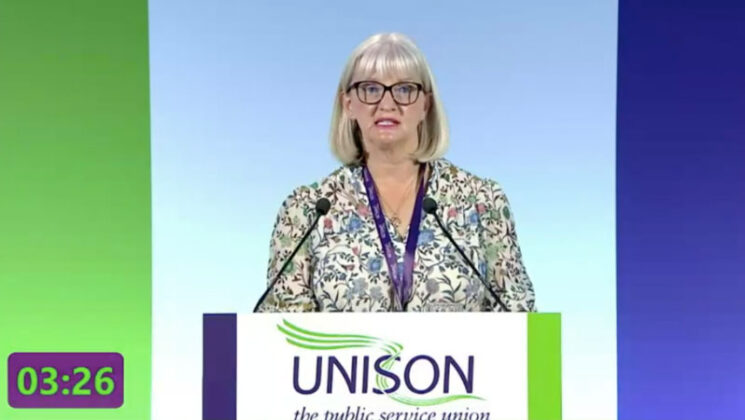Health conference delegates this afternoon considered two key factors that are leading colleagues to leave the NHS, notably the lack of flexible working and safe staffing levels.
UNISON lay leaders recently presented the Pay Review Body with evidence showing that over a third of staff were currently considering leaving their NHS jobs.
That’s on top of the thousands of disgruntled health workers who have already done so over the past decade.
Introducing a composite motion, Stuck in the vicious circle – staffing levels, career development and flexibility, Wilma Brown of the health service group executive (HSGE) – pictured above – told conference that many members felt completely unable to manage a healthy work-life balance because of the lack of flexibility in their jobs, something that was particularly problematic for working parents.
Many were choosing to leave the NHS for agency work, despite poorer pay and conditions, merely because it allowed them greater control over their hours.
Speaking of the stress, burnout and even post traumatic stress disorder (PTSD) currently being reported by health members battling the pandemic and its consequences, Ms Brown said: “Staff are suffering – moved around constantly to fill gaps, often working extra hours. And as winter fast approaches there is no let up, no cavalry coming over the hill to save them from what many describe as a waking nightmare.”
And she added: “We can’t afford to lose any more of our colleagues.”
UNISON has recently delivered significant improvements to contractual flexible working rights, through the NHS Staff Council, which will apply to Agenda for Change staff in England and Scotland from this autumn.
But the motion suggests that these new rights will not be used unless staff are supported to exercise them – and without branches holding employers to account, the process may be cosmetic or limited to certain occupational groups.
Delegates called on the HSGE to deliver actions that will put the NHS in the best position to retain and develop existing staff and attract new people into healthcare careers. These include:
- Complete bargaining work to embed flexible working contractual improvements across the devolved structures and produce materials to support local negotiations around implementation;
- Provide guidance and resources that will support branches to develop skills and expertise around flexible working and maximise use of the organising potential of this agenda;
- Produce guidance and useful resources for members so that they fully understand what options are available to them and how to prepare when putting in requests for flexible working.
Introducing the composite motion on safe staffing, Margaret Anne Hunter of Lanarkshire Health said that during the pandemic safe staffing had become “even less of a concern” for employers than it had been, with acceptable staff-patient ratios “falling by the wayside.”
And with staff being drafted into new, unfamiliar roles, with little training, “stress and anxiety has gone through the roof.”
As a result many staff nearing retirement were leaving as soon as they could, while university places for nurse training were not being filled.
“The NHS can only recover if members and colleagues are thriving in their jobs,” she said. “And this will only happen if there is safe staffing.”
While UNISON has long campaigned for safe staffing levels, conference agreed that this campaign must now evolve. The HSGE was charged with a series of moves that will better enable regions and branches to campaign locally.

